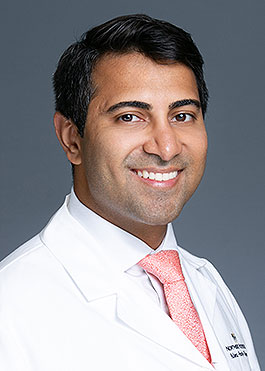
What is radiation therapy and how is it used in a cancer treatment plan?
Radiation therapy, or radiotherapy, is the use of various forms of energy to safely and effectively treat cancer and other diseases. Radiation therapy works by damaging the genetic material within cancer cells. Once this happens, the cancer cells are not able to grow and spread. When the damaged cancer cells die, the body naturally removes them.
Normal cells are also affected by radiation, but they can repair themselves in a way that cancer cells cannot. If radiation therapy is recommended as part of a treatment plan, a radiation oncologist will develop a customized plan to deliver radiation to the tumor area while shielding as much surrounding normal tissue as possible.
What are the various types of radiation therapy?
There are several forms of radiation therapy. Patients most commonly receive some form of external beam radiotherapy (EBRT), which refers to the delivery of tightly targeted radiation beams from outside the body. A course of EBRT involves several daily treatments (fractions) over the course of a few days to a few weeks.
Specialized forms of EBRT also exist, including, stereotactic radiosurgery (SRS) or stereotactic body radiation therapy (SBRT). SRS and SBRT are used to precisely deliver very high doses of radiation to small tumors, which allows patients to be treated in as little as one to five treatments.
In certain cases, internal radiation therapy is required. This is called brachytherapy and involves placing a sealed radioactive source inside, on or near the tumor. This can be permanent or temporary based on the cancer type.
What can be expected before and during the first radiation therapy session?
Before the first radiation therapy session, a consultation will occur to determine if radiation therapy is recommended as part of the treatment plan. Following this, a "CT simulation" or "mapping session" occurs, where the patient is placed in the exact position to be maintained during the actual treatment. Immobilization devices such as molds, casts, headrests or other devices are customized to assist in this process. A special treatment planning CT scan is then obtained. The radiation therapist (under the radiation oncologist's supervision) marks the area to be treated on the immobilization devices and/or the skin with either small, permanent tattoos or stickers. Next, the radiation oncologist designs a treatment plan in conjunction with a medical physicist and dosimetrist. The treatment plan undergoes rigorous quality assurances to ensure the radiation plan designed is as accurate and safe as possible. After this is completed, treatment can begin.
Do patients feel the radiation treatment and does it hurt?
Not at all! Radiotherapy is invisible and cannot be seen or felt.
What side effects may occur from radiation therapy and how can they be managed?
The side effects of radiation therapy vary based on the type of cancer being treated, the area being treated and the length and purpose of treatment. For example, when treating breast cancer, common side effects include skin redness, peeling and/or breast swelling. In contrast, for abdominal tumors, common side effects include diarrhea, nausea and/or cramping.
The one systemic side effect that is common to all radiotherapy treatments is fatigue. Interestingly, studies have shown less fatigue among patients who exercise and continue with typical daily activities. To help manage side effects, patients are monitored during the course of treatment and may be prescribed over-the-counter or prescription medications, as needed.
What can be done to protect the healthy body tissue and/or skin during treatment?
The radiation oncologist will discuss individualized ways to protect healthy body tissue during treatment. This could include certain skincare regimens or dietary recommendations.
Are patients radioactive after treatment?
Thankfully, patients do not become radioactive after treatment! There are no restrictions in terms of being around family and friends.

